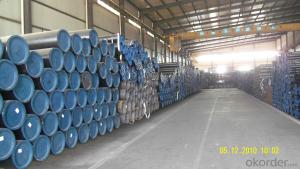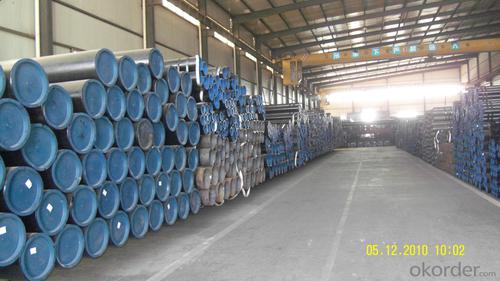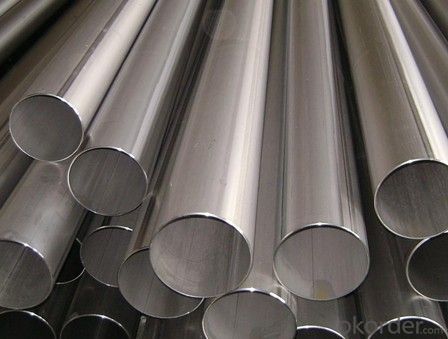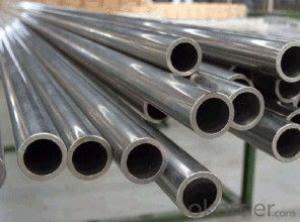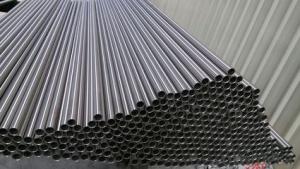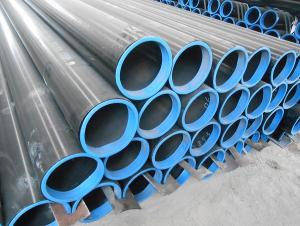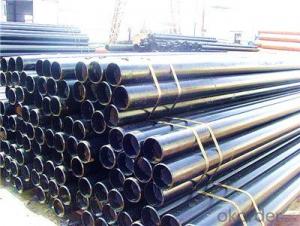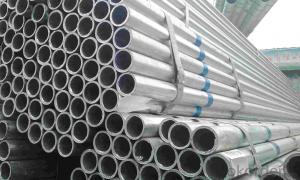Seamless Pipe with High Quality
- Loading Port:
- China Main Port
- Payment Terms:
- TT or LC
- Min Order Qty:
- -
- Supply Capability:
- -
OKorder Service Pledge
OKorder Financial Service
You Might Also Like
Specifications
1. OD 21MM-1066MM, WT 2MM-60MM
2. certificate: ISO, API
3. Strength: large diameter thick wall seamless pipe
4. BE, PE.
Carbon Steel Seamless Pipes | |
OD | 21.3mm-1066.8mm(1/2”-42”) |
WT | 2mm-60mm |
Length | Random Length: 3.5m-12m, or fixed length 5.8m or as the customer’s requirement. |
Standard | ASTM A53, ASTM A106, API 5L, DIN 17175, GOST8731/8732, G3457/G3452 etc. |
Material | Q235B, 10#,20#,45#, 16Mn, 15MnV. A53B, A106B, API5L B, A192, A179C, A213-T12, A213-T22, A335-P1, A335-P2, A333 ST37, ST33, ST37-2, ST35.8 ST42 etc. |
Certificate | API certificate and ISO certificate. |
Surface | Rust remove, black painting, antirust oil, varnish, 3PE, hot-dip galvanized etc. |
Package | By bundles, plastic caps or steel caps, woven, wooden cases or as requirement. |
Capability | 6000tons/month. |
End | BE/PE. |
Advantage | Big diameter and thick wall pipes. Best price with good quality. The partner you can trust. Good service and very patient. |
Seamless steel pipe | ||||
Alloy pipe | Cr5Mo(P5, STFA25, T5) 15CrMo(P11, P12, STFA22) 13CrMo44 12Cr1MoV P22 (10CrMo 910) T91, P91, P9, T9 Wb36 | GB5310-95 GB9948-88 ASTM335/A335M ASTM213/213M DIN17175-79 JISG3467-88 JISG3458-88 | 16-824*2-100 | The seamless steel pipe features resistance to high pressure, high/low temperature and corrosion and is used in the industries of petroleum, chemical engineering and electric power as well as boiler |
High-pressure boiler pipe | 20G, A106, ST45.8/ | GB5310-95 ASTMA106-99 DIN17175-79 | 14-630*2-80 | Temperature-resistant seamless steel pipe for high-pressure boiler |
High-pressure seamless pipe for petroleum cracking and fertilizer making equipments | 20, 12CrMo, 15CrMo | GB9948-88 | 10-530*1.5-36 | Boiler price for refinery, heat-exchanging pipe, seamless steel pipe for pipeline |
20, 16Mn, Q345 | GB6479-2000 | 18-530*3-40 | Fertilizer making equipment and pipe line | |
Low and medium pressure boiler pipes | 10, 20 | GB3087-1999 | 10-530*2-40 | Over-heat pipe for low and medium-pressure boiler, boiling water pipe, locomotive smoke pipe(big and small) |
Fluid pipe | 20, Q345 | GB/T8163-1999 | 8-630*1.0-40 | |
Structural pipe | 10,20,35,45, 16Mn, Q345B | GB/T8162-1999 | 6-1020*1.5-100 | |
Line pipe | Grade B | API | 60-630*1.5-40 | Carrying gas, water or oil in the industries of petroleum and natural gas |
Hydraulic prop pipe | 27SiMn | GB/T17396-1998 | 70-377*9-40 | |
Ship pipe | 410 | GB/T5312-1999 | 14-426*1.5-45 | Pipes for ship, boiler and over-heater |
FAQ of Seamless Pipe:
①How is the quality of your products?
Our products are manufactured strictly according to national and internaional standard, and we take a test on every pipe before delivered out. If you want see our quality certifications and all kinds of testing report, please just ask us for it.
Guaranteed: If products’ quality don’t accord to discription as we give or the promise before you place order, we promise 100% refund.
②How about price?
Yes, we are factory and be able to give you lowest price below market one, and we have a policy that “ for saving time and absolutely honest business attitude, we quote as lowest as possible for any customer, and discount can be given according to quantity”,if you like bargain and factory price is not low enough as you think, just don’t waste your time.Please trust the quotation we would give you, it is professional one.
③Why should you chose us?
Chose happens because of quality, then price, We can give you both.Additionally, we can also offer professional products inquiry, products knowledge train(for agents), smooth goods delivery, exellent customer solution proposals.Our service formula: good quality+good price+good service=customer’s trust
SGS test is available, customer inspection before shipping is welcome, third party inspection is no problem.
Seamless Pipe Images:
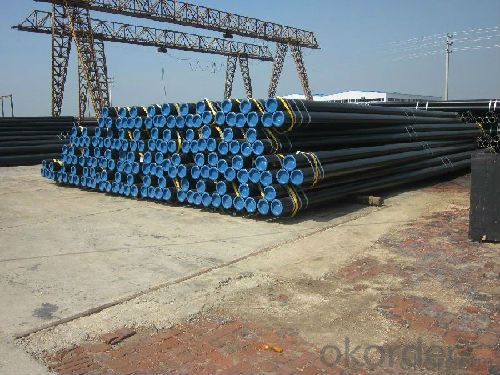
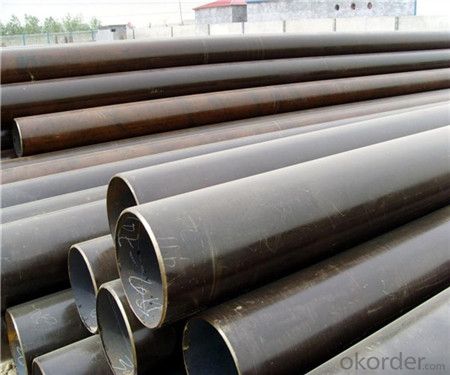
- Q: How are steel pipes used in the automotive exhaust system?
- Steel pipes are used in the automotive exhaust system to transport and direct the flow of exhaust gases from the engine to the rear of the vehicle. These pipes are durable, heat-resistant, and corrosion-resistant, making them suitable for withstanding the high temperatures and harsh conditions of the exhaust system. Additionally, they help reduce noise and emissions by providing a pathway for the gases to exit the vehicle efficiently.
- Q: Is steel pipe made of profiles?
- According to the shape of the cross-section, the steel is generally divided into profiles, plates, pipes and metal products in four categories.Therefore, the steel pipe belongs to the pipe, not the profile.
- Q: What is the difference between seamless steel pipe and welded pipe?
- The thicker the diameter, the more commonly the spiral weld. The seamless steel pipe is generally molten state molten steel through the annular slot backlog, and then stretched and other treatment process, so that there is no weld. On the performance, especially the pressure capacity of the steel pipe than ordinary steel has greatly improved, so often used for high voltage equipment.
- Q: How do steel pipes handle extreme weather conditions?
- Steel pipes are highly durable and can withstand extreme weather conditions. They have excellent resistance to corrosion, making them suitable for humid and coastal areas. Additionally, steel pipes can withstand high temperatures, making them reliable in extreme heat or cold. Their strength and resilience make them ideal for various applications, including oil and gas pipelines, water supply systems, and construction projects in harsh weather environments.
- Q: How do steel pipes handle pressure surges?
- Steel pipes are designed to handle pressure surges effectively due to their inherent strength and durability. The high tensile strength of steel allows it to withstand significant pressure fluctuations without deforming or bursting. Additionally, the seamless construction of steel pipes ensures a smooth and continuous flow, minimizing the impact of pressure surges. Furthermore, steel pipes can be reinforced with additional support structures, such as braces or anchors, to further enhance their ability to handle pressure surges.
- Q: How long are the seamless tubes? Are they six meters long?
- The length of the seamless tube is 3000~12000mm, including 6 meters.
- Q: What are the different types of steel pipe hangers?
- In various industries and applications, steel pipe hangers are widely used to support and secure pipes, ensuring proper alignment and preventing sagging or movement. Let's explore some of the different types of hangers available: 1. Clevis Hangers: These hangers consist of a U-shaped metal bracket called a clevis, which is connected to the supporting structure using a threaded rod. Clevis hangers allow for vertical adjustment and are commonly used in suspended piping systems. 2. Split Ring Hangers: Circular metal rings that are split on one side, split ring hangers can be easily opened and closed around the pipe to provide a secure hold. They are often used for suspending horizontal pipes. 3. Beam Clamps: Beam clamps are designed to attach to structural beams or channels, offering a secure mounting point for pipe hangers. They come in various designs, such as top flange, bottom flange, and side mount, to accommodate different installation needs. 4. Swivel Hangers: Used for supporting pipes that undergo thermal expansion or contraction, swivel hangers allow horizontal movement while still providing support and preventing excessive stress on connections. 5. Riser Clamps: Riser clamps are used to support vertical pipes or risers. Typically consisting of a metal band that wraps around the pipe and a threaded rod connecting it to the supporting structure. 6. Pipe Roller Supports: Pipe roller supports are utilized when pipes need to move horizontally due to expansion or contraction. These hangers consist of a series of rollers that allow the pipe to move freely while still providing support. 7. Pipe Saddles: Pipe saddles are U-shaped brackets that wrap around the pipe, providing support on both sides. They are often used to secure pipes to walls or other structures. These examples showcase the variety of steel pipe hangers available. Selecting the appropriate hanger for each application is crucial, taking into account factors such as pipe size, weight, location, and required movement allowance. This ensures proper support and functionality of the piping system.
- Q: Can steel pipes be used for underground transportation tunnels?
- Yes, steel pipes can be used for underground transportation tunnels. Steel pipes are often used in the construction of underground tunnels due to their durability, strength, and resistance to corrosion. They can efficiently withstand the pressure and weight of the surrounding soil and provide a reliable transportation infrastructure.
- Q: Hot galvanized steel pipe for use?
- Hot galvanized pipe: in order to improve the corrosion resistance of steel pipe, galvanized steel pipe. Galvanized steel pipe hot galvanized and galvanized two kinds, hot galvanized, zinc coating thickness, zinc plating cost is low, the surface is not very smooth.The hot-dip galvanized pipe is an alloy layer that causes molten metal to react with the iron matrix, thus combining the substrate with the two coating. Hot dip galvanizing is the first steel pickling, in order to remove iron, steel pipe surface after pickling, cleaning by ammonium chloride or zinc chloride solution or ammonium chloride and zinc chloride aqueous solution tank, and then into the hot dip tank. Hot galvanizing has the advantages of uniform coating, strong adhesion, long service life and so on. A complex physical and chemical reaction is formed between the steel tube matrix and the molten plating solution to form a corrosion resistant structure with a tight zinc - iron alloy layer. The alloy layer is integrated with the pure zinc layer and the steel pipe matrix. Therefore, it has strong corrosion resistance.
- Q: How do you calculate the pipe friction loss coefficient for steel pipes?
- To calculate the pipe friction loss coefficient for steel pipes, you need to consider several factors. One of the most common methods used is the Darcy-Weisbach equation, which relates the frictional head loss in a pipe to the flow rate, pipe diameter, pipe length, fluid properties, and the pipe roughness coefficient. The Darcy-Weisbach equation is expressed as: hf = (f * L * V^2) / (2 * g * D) Where: hf is the head loss due to friction, f is the pipe friction factor, L is the pipe length, V is the fluid velocity, g is the acceleration due to gravity, and D is the pipe diameter. The pipe friction factor, f, is the key parameter that needs to be determined. For steel pipes, this factor depends on the pipe roughness coefficient, which represents the relative roughness of the pipe. The relative roughness is calculated by dividing the absolute roughness of the pipe surface by the pipe diameter. The pipe roughness coefficient can be obtained from various sources, such as manufacturer specifications, engineering handbooks, or experimental data. It is important to ensure that the roughness coefficient used matches the specific type and condition of the steel pipe being analyzed. Once you have the pipe roughness coefficient, you can use it to calculate the pipe friction factor using empirical correlations or charts. These correlations often involve Reynolds number, which is a dimensionless quantity that characterizes the flow regime. By substituting the obtained pipe friction factor into the Darcy-Weisbach equation, you can calculate the head loss due to friction for steel pipes. This value is essential in designing piping systems, determining pump requirements, or estimating energy consumption in fluid flow applications.
Send your message to us
Seamless Pipe with High Quality
- Loading Port:
- China Main Port
- Payment Terms:
- TT or LC
- Min Order Qty:
- -
- Supply Capability:
- -
OKorder Service Pledge
OKorder Financial Service
Similar products
Hot products
Hot Searches
Related keywords
